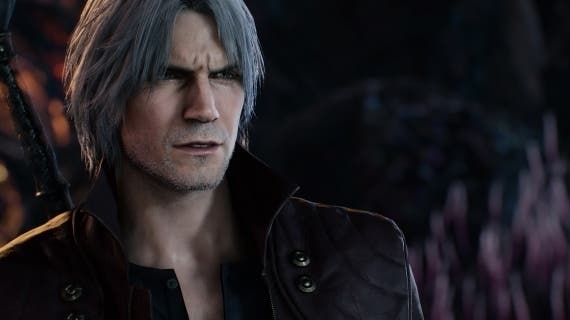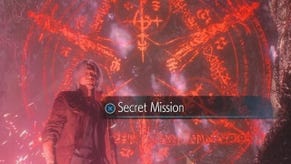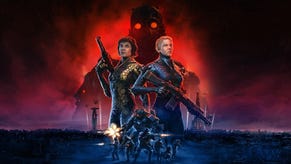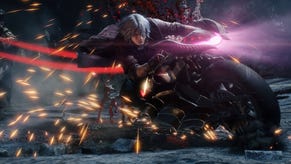The devil within: Hideaki Itsuno on 25 years at Capcom
The man behind Dragon's Dogma, Darkstalkers, Rival Schools and so much more looks back on his career.
Capcom, you might have noticed, is on a bit of a roll. Monster Hunter finally met with the global success it's always deserved, its survival horror series won back its fans with the pure horror of Resident Evil 7 and the superlative reimagining of Resident Evil 2, and even the humble Mega Man series is on surer footing than it's been for a while. Really, though, it's what's coming next that really excites me: Devil May Cry 5 isn't just the return of Capcom's most stylish series. It's the return of Capcom's most accomplished director.
Hideaki Itsuno last sat in the director's chair for 2012's Dragon's Dogma - a standout title in a sometimes troubled era for Capcom's last generation - but you can trace his history with the company much further back than that. "After I got out of college, I thought to myself, well, I could be a teacher, that might be okay," he tells us on the London leg of Devil May Cry 5's final press tour, the interview taking place at the top of a mist-shrouded Shard. "But then I thought, you know, I'm going to have to spend 35 years working before I retire, so I should probably go and do something I'm going to enjoy."
And Itsuno enjoys video games. Actually, that's not quite right - he loves them. On his desk at Capcom headquarters in Osaka is a CRT TV he uses to indulge his passion for older games - late last year it was Famicom baseball game Famista, though right now it's SNK's 1990 action RPG God Slayer that's keeping him occupied.

It's that same passion that got Itsuno his big break. When he joined Capcom in 1994 (and asked why it was Capcom that appealed to his 23-year-old self, the Osaka-native says with deadpan humour that it was simply because of the easy commute) Street Fighter was at its peak. Itsuno, though, was a fan of the fighting output of that other Osaka juggernaut of the 90s; SNK.
"I was in the arcade section - my sensei was Noritaka Funamizu who made all sorts of games - Sidearms, Super Street Fighter 2 Turbo - and back then, the young hires would have to come in early and take care of the trash. So I'd do that, and I'd have some time to kill before the real work starts. I'd be sitting there, playing King of Fighters on Neo Geo. And one time my boss came in and said if you're such a big fan of fighting games, why don't you work on Street Fighter?"
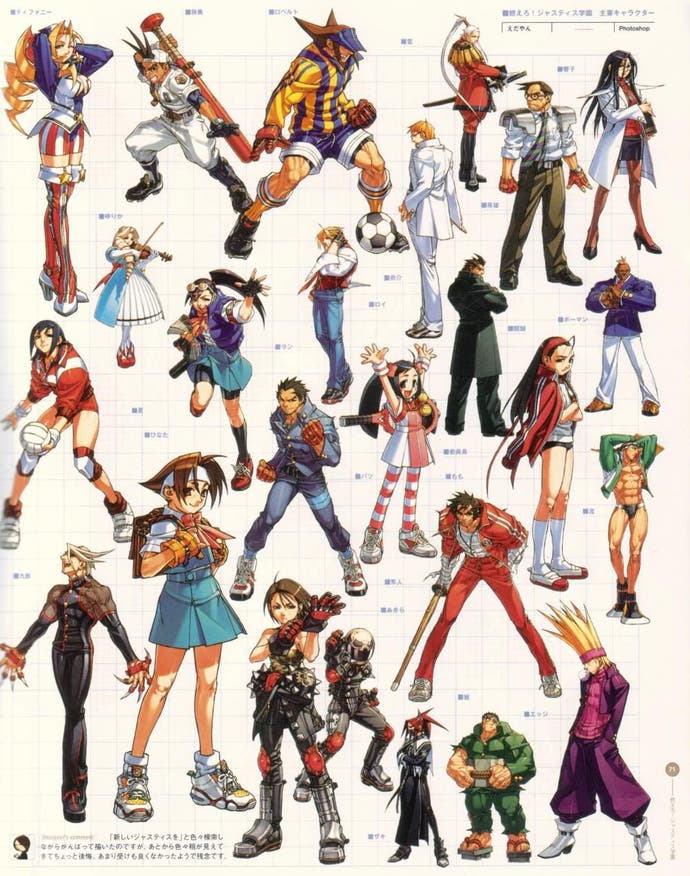
Itsuno, who had previously worked on two quiz games, was understandably elated at the opportunity, and acted as a key figure in what would become Street Fighter Alpha; the first all-new Street Fighter game since the all-conquering Street Fighter 2, and something of a new direction for the series.
"Up until that point, Capcom was known for making these really complex fighting games - there's a lot of nuance to them, the designs were very complex," Itsuno explains. "But then you had SNK, they were making stuff that would have the broadest appeal possible - all the characters looked pretty fucking cool, they all have really badass moves. For Street Fighter Alpha, we wanted to take that kind of approach - let's make something that looks more anime, that can appeal to a broader audience. And in order to make something that could appeal to a broader audience, to young people, we need young people to make the game. That's another reason I was picked for the game."
The Alpha series is still beloved today - indeed, you can see its influence quite heavily in Street Fighter 5, where characters created by Itsuno take centre stage. "I handled a lot of those characters," Itsuno says. "Birdie, Rose, Adon, Charlie, Sodom... When I was making them, one thing I really wanted to do was make a character that was going to be the one that could crush Ryu and Ken. I very specifically had that in mind when I was creating Birdie and Rose."
If there's a constant in Itsuno's early career at Capcom, it's that he oversaw so many of the company's iconic fighting games, from the Alpha games to Darkstalkers, Power Stone and Rival Schools. "It's not necessarily fighting games, per se," says Itsuno of the appeal of the genre. "I like games where people can challenge each other. Whether you're talking about that, or something like Momotaro Dentetsu (a Japanese board game), I love those kinds of games."
His tenure on the genre included classics, but also challenges, helping oversee the sometimes troublesome shift from 2D to 3D, first with Star Gladiator and later, more successfully, with Rival Schools. "The challenge came from battling with the hardware," he says. "The specs weren't quite equal to what we wanted to do. Street Fighter, that was a 60fps kind of game - but when we were making Star Gladiator, we were locked into 30fps. And that was hard. Because not only were we battling with that, there were weapons too. We'd find that because it was 30fps, the collision wouldn't work as it should. With that in mind, I pretty much came up with the spec of Rival Schools. I came up with the foundation, all of the ideas including the tech, including the polygon count, just so we could run that at 60fps."
Rival Schools, and perhaps more specifically its sequel Project Justice, remains an all-time classic, a madcap brawler that drew on Itsuno's love of a certain strand of anime and manga that focuses on battling school-kids. It's a series he's expressed an interest in, and one that still resonates with fans today. "It was just the idea that *everybody's* been to school. Because everyone's been to school, they all have a frame of reference for this - so hopefully it'll sell really well, because everyone can understand it."
If fighting games formed the foundation of Itsuno's Capcom career, it's another series that's defined the latter half of it - even if it's not a series he created. In 2002, Itsuno was working on creating an all-new game at Capcom, a lavish RPG with strong western leanings, when he was called upon to help an ailing attempt at a Devil May Cry sequel that had been rushed into production on the back of its predecessor's success.
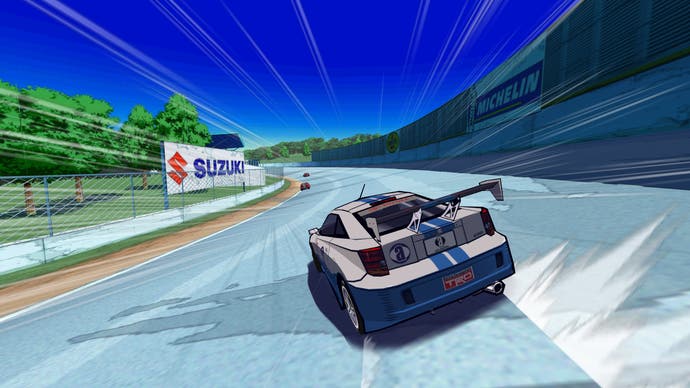
"There was a period during Devil May Cry 2's development where things weren't going very well," picks up Itsuno. "And so my boss comes to me, he figures I'm in the same group as the director, and he's one of top players - he comes to me and says Devil May Cry 2 isn't going so well, is there anyone you know that could work on this? And I was like, this guy's busy on this thing, this person's busy - so he was like, alright, you do it."
Devil May Cry 2 might have been a critical flop, but it's a miracle it made it out at all - by the time Itsuno came onboard, there were six months left until it had to be completed, and next to nothing had been implemented yet. Little would he know he'd stick with the series for the best part of two decades. "It's interesting, because back then, I was actually coming up with the foundations of what would become Dragon's Dogma, and then I was taken and forced to work on Devil May Cry 2," he says. "And of course the rest is history - I went from that to Devil May Cry 3 and then Devil May Cry 4."
So far has the series come since its beginnings as a retooling of an early attempt at a Resident Evil 2 follow-up that Itsuno's name has become synonymous with Devil May Cry 5. He's seen it through highs and lows, from the much-loved Devil May Cry 3 to the divisive - but, it should be pointed out, brilliant - DMC all the way through to Devil May Cry 5, which with its three distinct characters looks to be the most exquisite balancing act the series has pulled off to date. His biggest challenge while working at Capcom, though? It's not even turning around Devil May Cry 2 in a mere six months, it turns out.
"Dragon's Dogma!" he says. "That was a brand new series - a lot of other stuff I'd done was already established. It was one of the first real new things. And back then it still wasn't quite so common for Capcom to do a simultaneous worldwide release, plus we were doing all this new stuff with the pawn system."
To say Itsuno holds Dragon's Dogma dear would be something of an understatement. It's the game he's proudest of from his time at Capcom, and you can even see flashes of it in Devil May Cry 5 - new character V, with his ranged attacks and devious use of magic, can feel like a straight lift of a sorcerer from the 2012 RPG. I don't think it would be too much of a stretch to imagine a Dragon's Dogma sequel sits somewhere in Itsuno's future.
"I've mentioned this before, but when we started Devil May Cry 5, I'd gone to the people up top and said let me make either Devil May Cry 5 or Dragon's Dogma 2," he says. "I thought Devil May Cry 5 would be the better choice right now, so did that. If I could, I'd love to make Dragon's Dogma 2 - it'd be awesome."
It'd likely be another feather in the cap for Itsuno in a career at Capcom that's now spanned a quarter of a century and seen the creation of some true greats, from Project Justice and its sparring school-kids all the way through to the lavish Devil May Cry 5. And throughout all that, Itsuno says his approach has always been the same.
"For Rival Schools, there were all these ridiculous ideas in there," he says. "The way we approached it, though, is that here are all these ridiculous ideas, and we had to be absolutely serious about realising them. It's the same thing for Devil May Cry 5 - in real life, you'd never attack anyone with a motorcycle, right? You'd never break one in half and attack someone with it, or with a cowboy hat. But it's always been about taking those ridiculous ideas and approaching them completely seriously."
